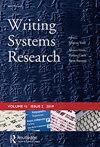Reading and spelling processes in EFL amongst Hebrew and Arabic speakers of differing ability levels: similarities and differences
Q1 Arts and Humanities
引用次数: 2
Abstract
ABSTRACT The present study examined reading and spelling of regular and irregular words in English as a foreign language (EFL) amongst 4th-grade native Arabic and Hebrew speakers. The reading and spelling tasks was drawn from the same pool of lexical items, which were categorised based on how closely they adhered to basic grapheme-phoneme correspondences (regular/irregular). Results showed overall reading scores were higher than spelling scores. Arabic speakers outperformed Hebrew speakers on the word reading task, indicating a potential multilingual advantage. No difference was found between the language groups on word spelling. Irregular words received higher scores than regular words on the reading task whereas opposite results were found for the spelling task, with regular words receiving higher scores than irregular words. When the participants were divided into good and poor ability groups, the three-way interaction indicated that whilst language and word regularity were not related to word reading within the good group, within the poor group irregular words were read with higher accuracy scores. The applicability of existing theoretical models of reading and spelling development for English L1 is considered in light of these cross-linguistic findings. Pedagogical implications relating to differences between language and ability groups are discussed.不同能力水平的希伯来语和阿拉伯语使用者的英语阅读和拼写过程:异同
本研究调查了四年级母语为阿拉伯语和希伯来语的人在英语作为外语(EFL)中规则和不规则单词的阅读和拼写。阅读和拼写任务是从同一组词汇项目中抽取的,根据它们与基本的字形-音素对应关系(规则/不规则)的紧密程度进行分类。结果显示,总体阅读分数高于拼写分数。说阿拉伯语的人在单词阅读任务上的表现优于说希伯来语的人,这表明他们具有潜在的多语言优势。语言组之间在单词拼写上没有发现差异。在阅读任务中,不规则单词比规则单词得分更高,而在拼写任务中,结果正好相反,规则单词比不规则单词得分更高。当参与者被分成能力好的组和能力差的组时,三方互动表明,在能力好的组中,语言和单词的规律性与单词阅读无关,而在能力差的组中,不规则单词的阅读准确率更高。根据这些跨语言的研究结果,我们考虑了现有的阅读和拼写发展理论模型对英语第一语言的适用性。讨论了语言和能力群体之间差异的教学含义。
本文章由计算机程序翻译,如有差异,请以英文原文为准。
求助全文
约1分钟内获得全文
求助全文

 求助内容:
求助内容: 应助结果提醒方式:
应助结果提醒方式:


